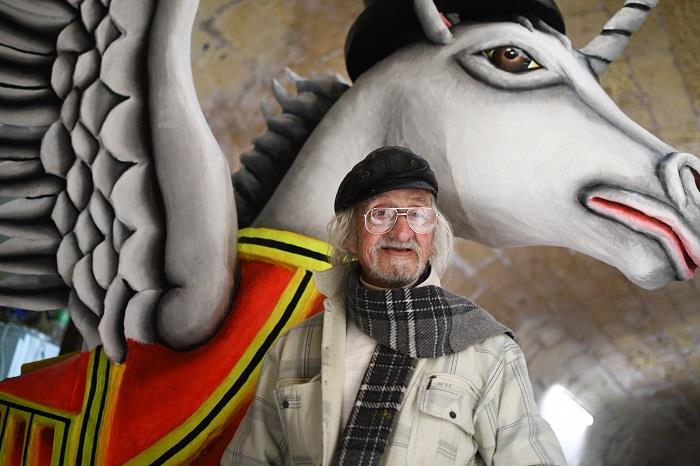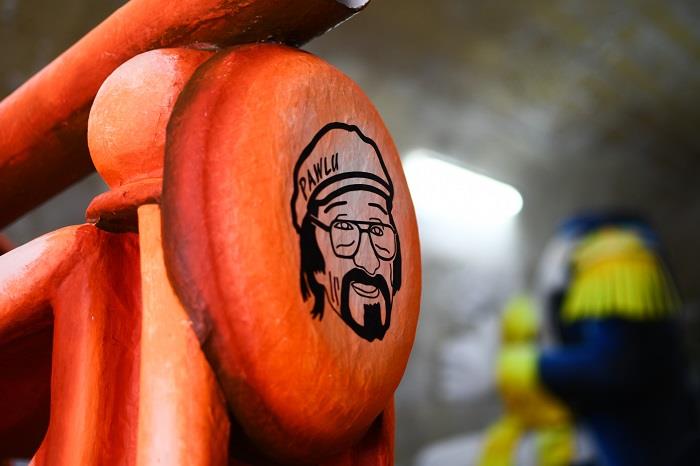Anyone who is familiar with Carnival in Malta knows that Pawlu Curmi, 'il-Pampalun', is its absolute number one fan. But the ultimate declaration of Mr Curmi's love for the age-old tradition came when he recently told his wife that he wishes to die during Carnival.
The Malta Independent on Sunday caught up with Mr Curmi at the lower St Elmo warehouse he has worked in for the past 67 years. "People are right in saying that my face is synonymous with Carnival because I do all that I do out of love for this tradition, not for money."
Il-Pampalun has been contributing to the Christian tradition, which was introduced to Malta by the Knights, since the 1950s. "I became involved because I followed in my father's footsteps," he says, recounting how his father had once put wheels on a wooden bed and dressed like a baby. "He also organised carnival parades, so I was always very much involved in dancing and playing instruments. When I was a bit older, I started playing the drums. My father was delighted that I was taking such a big interest, especially after I played the conga for him, and he bought me drums and cymbals."

His love for percussion instruments remains strong. "I sing this to my wife," Pawlu says, as he breaks into his own rendition of Elvis Presley's 'It's now or never,' using a wooden barrel as a makeshift conga drum.
"I would not trade carnival with anything in the world," he says, with his usual beaming smile.
Next, he explains how the floats are constructed. "I worked on the inner frame of this piece of the float. This is a horse dressed as a Beefeater," he says. "There is also a figure dressed as Napoleon," pointing to the far end of the workshop, where a headless figure dressed in blue, 18th century uniform, complete with golden epaulettes, waits for the final touches.
Some people say that Carnival will not be the same without il-Pampalun. But Pawlu does not plan on giving up yet. "I am 86 and my health is not so good. My eyes bother me and my throat is sore."
He says his wife, whom he loves dearly (he keeps a picture of Doris in her younger days and another of a 20-something Pawlu in his wallet) has begged him to give it all up to look after himself. "Last year I contracted bronchitis out in the cold. They rushed me to hospital and told me I was in danger of dying. I said I would have been pleased if I died there, in the square. The doctor asked me why. I said because my whole story is there. That is where I was given the Ġieħ ir-Repubblika, Ġieħ il-Belt Valletta. I was always good to everyone. People in Valletta know me and love me. I don't know if I should listen to my wife. We had an argument and she asked me what it is that I want. I said I wished to die during Carnival. The final day will come someday."

Pawlu had to leave us at this point because he had to see to the final choreography preparations. He comes up with a different dance routine each year and composes the accompanying music with George Curmi, 'il-Puse', who is Pawlu's nephew. Il-Pampalun's company competes in the A Category with a float, costumes and 32 dancers.
After Pawlu had walked up the steep, stone ramp leading up to the fort's gate - something his friends say has kept him fit for all these years - we spoke to some of the other people busy working on final preparations in the workshop; Charlie Curmi, one of Pawlu's nephews, grand-nephews Yorath and Kevin, and Joe Zammit, a friend of the family who has been with the company for 30 years.
The entire team comprises some 14 people who perform different tasks, including designing and producing the costumes, constructing the frame for the float and covering it in papier-mâché, the paint job and ensuring electrical and mechanical movement works.
"All this work takes around nine months, says Kevin, the electrical specialist. "We usually start working in June."

As a testament to these people's passion for Carnival, Charlie Curmi says the team members go out of pocket by considerable amounts. "The floats cost around €6,000 to €7,000. This includes metal, wood, paint, wiring and so many other materials. To give you a better idea, the prize money for 1st place is around €3,000."
Money is not the only thing they invest, says Yorath. "We spend so much time here. It is normal for us to work until 4am, not only now that Carnival is round the corner, but all year round."
The team members explained to us the long and laborious process used to build the floats. These giant, papier-mâché structures are built in parts and the entire thing is then assembled on the street. "People don't appreciate all the work that goes into this stuff. They don't believe us when we say we spend nine months working on it," Charlie says.
Visiting the workshop on Thursday afternoon we could see his point, and it seemed that there was still much that needed to be done before carnival. We decided that we had already taken enough of their precious time, so we packed up and left them to it.